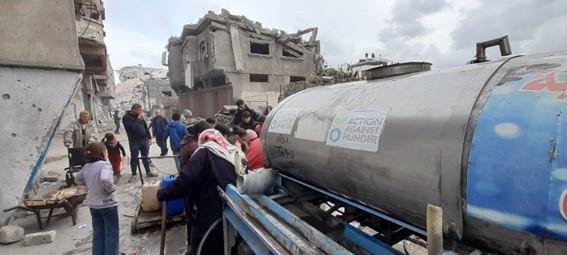

Action Against Hunger urges increased humanitarian aid to Gaza after the opening of crossings: “The 600 trucks a day planned in the ceasefire are not enough”
REACTIONS TO THE IMMINENT ANNOUNCEMENT OF THE CEASEFIRE IN GAZA
- Thousands of families have been in extreme hunger for months, not knowing when or where their next meal will come from. The opening of the land crossings announced in the ceasefire is vital
- Before the conflict, Gaza received about 500 trucks of humanitarian aid per day. By 2024, this number was reduced to only 100 trucks per day. Although the ceasefire pledges to increase the flow to 600 trucks per day, Action Against Hunger warns that this number is still insufficient, as humanitarian needs are now more critical than ever.
- In addition to increasing the influx of trucks, it is crucial to reduce restrictions on the types of supplies allowed, especially those needed to rehabilitate water and sanitation services, and winter essentials such as tent platforms and waterproof clothing.
Action Against Hunger urges the international community to ensure the implementation of the ceasefire agreement and calls for its efforts to be directed towards the rehabilitation of infrastructure and the establishment of a lasting peace.
Madrid/Jerusalem, 15 January 2025. “Thousands of families have been in extreme hunger for months, not knowing when or where their next meal will come from. The opening of the land crossings announced in the ceasefire is vital," explains Natalia Anguera, head of operations in the Middle East for Action Against Hunger. "We are calling for the opening of as many entry points as possible to ensure that humanitarian aid reaches the entire population of the Strip, a territory where internal mobility restrictions could leave entire areas without the necessary support”.
Before the conflict, around 500 trucks of humanitarian aid entered the Strip every day. However, in recent months, the volume of inflows has been negligible: in 2024, only about 100 trucks per day on average. "We welcome the 600 trucks per day agreed in the ceasefire, but it is important to remember that even before the conflict, the humanitarian community was already claiming that 500 trucks per day was insufficient. It is more necessary than ever to increase the amount of aid, given that the level of destruction and humanitarian needs are extraordinarily more critical now than they were before October 2023," remarks Action Against Hunger's Middle East operations head.
"In addition," adds Anguera, "there are numerous limitations on importing certain types of supplies. In addition to the entry of trucks, we need the ease on restrictions on the type of materials allowed, especially those related to the rehabilitation of water and sanitation services and essential items to cope with the winter, such as platforms for levelling tents and waterproof clothing," she explains.
The new scenario that is opening up
"In this new scenario brought about by the ceasefire," notes Natalia Anguera, "we hope to be able to recover the activities we were doing before October 2023, which focused on ensuring that Palestinians have the tools to lead. It is essential that all humanitarian activities that follow are of a complementary nature to Palestinian civil society organisations and NGOs. If bakeries and hospitals can be rehabilitated and functioning, we will be able to, for example, expand our support to women's cooperatives in Gaza or increase our nutrition activities in the most affected areas, such as northern Gaza". Natalia Anguera adds: "The level of destruction is enormous in Gaza, and we will have to support shelter spaces for people who have lost their homes, as well as help in the rehabilitation of houses and structures.”
Action Against Hunger has been working in Gaza for more than 20 years. Since October 2023, the organisation's teams have had to focus all their efforts on scaling up the emergency response under unprecedented working conditions. In Gaza alone, Action Against Hunger increased its staff from 60 to 130 humanitarian workers. All this has enabled Action Against Hunger to help more than one million people in Gaza and the West Bank through activities to prevent and treat malnutrition among women and children, through the distribution of meals and clean water, and through support to farmers and small businesses to support their livelihoods and the production of fresh food and vegetables in Gaza, among other activities.
